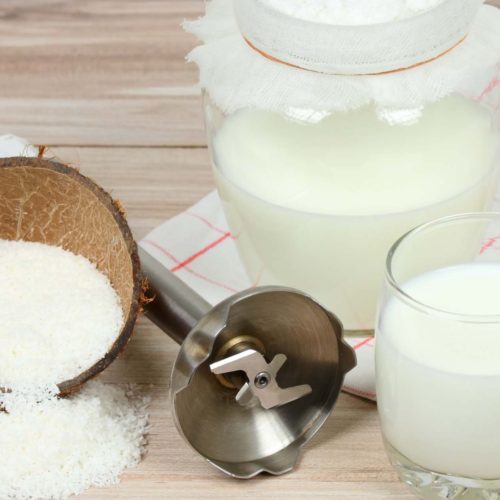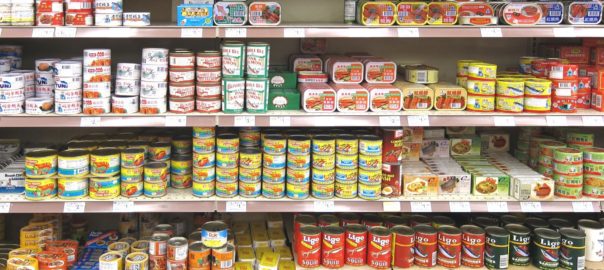Due to the invention of canned foods in the early 1800's our ability to store food for long periods of time has dramatically increased. (I am always amused every time I remember the can opener wasn't invented until approximately 50 years after the invention of the can -- I discovered this while researching my book The Pantry Principle.) And if the ingredients in the can are dry or dehydrated in some way that storage can be as long as 30 years. Quite handy if you're preparing for the Zombie Apocalypse.
There are two major types of canned goods, those you make yourself at home (such as jams, pickles, chutneys, etc), and those you purchase at the grocery store. For the purposes of this post when I talk about canned goods, I'm referring to those that you purchase.
Leaving aside the matter of zombies, it is prudent to have some canned goods on hand either as part of a well-managed pantry, or in case of an emergency. While it's a great thought to prepare all of your food fresh and from scratch, in our over-scheduled American culture this can be a little difficult to achieve on a daily basis. And if the power goes out or there's a storm preventing you from getting out to the store it's helpful to have canned goods on hand.
How much you have on hand is a matter of calculation; determining how many people, how many days/meals you want on hand, and how you plan to rotate things through your storage. That's a little more complicated than can be addressed in a blog post. If you're interested in working with me to figure out your food storage needs email me and we'll schedule a time to talk.
When buying canned goods one of the big issues is what's in that can. I've talked about this before in The Pantry Principle as well as in blog posts like this one about peaches. Unfortunately many canned foods these days come with a raft of chemicals added to them. This is meant to extend the shelf life. However given the fact that there are alternatives I'm not convinced that we need to buy canned food with these health-harming additives in them.
One specific example that I use when demonstrating this to clients on a Grocery Store Tour* is coconut milk. Canned coconut milk is an option that is (a) more portable than the refrigerated cartons, and (b) easier than making your own (recipe below for those who really want to know how).
However many brands of canned coconut milk contain harmful ingredients that you don't want to consume such as sodium metabisulfate, polysorbates, and possibly citric acid which is, contrary to popular belief, not from lemons but often from corn, making it a probable genetically modified ingredient. So an important point when purchasing canned coconut milk, or any canned ingredient, is to look at the ingredients list and avoid ingredients you don't want to eat.
Even more challenging however is the use of BPA in many canned foods. And this includes those canned foods that come in jars because the lids have BPA in the lining. BPA is an obesogen, a hormone disrupting chemical, and something that you want to avoid as much as possible. Sadly it is extremely difficult to avoid it altogether as it also appears in paper products, grocery store receipts, DVDs, reusable cups, and other places. But the more we reduce BPA in our food, I believe the better off we are.
This requires more research, looking for brands which don't have BPA in their can lining. I have compiled a list, based on information from the vendors, that lists BPA free producers. Bear in mind that some of these companies are still in transition. However they are making the effort, and spending the money (BPA free linings are more expensive), to bring you a BPA free lined can:
- Amy's
- Eden Foods
- Muir Glen
- Native Forest
- Sprout's - I believe they're still working on it
- Trader Joe's - in transition
- Wild Planet - in transition
On a side note: In the United States 1 in 6 people doesn't have enough to eat. Approximately 14 million of them are children. If you're cleaning out your pantry and shifting to foods which are free of chemicals and BPA you may want to donate them to the Food Pantry. If your budget has a little room to spare consider buying a little extra and donating it. As much as I teach and promote eating as clean as possible, I also believe that eating is better than not eating. It's a good-better-best philosophy. Click here to find a food pantry near you.
Something else to keep a lookout for which may be coming soon to a canned product near you is SLIPS. This stand for Slippery Liquid Infused Porous Surface. It's a product which has been invented to get the container absolutely squeaky clean. Unfortunately it looks like it's going to be made from chemicals and infused into a teflon substrate which will then be used to coat or line the inside of your jars and bottles. I'm waiting and watching. If you find a ketchup container (or any other jar) that comes absolutely clean with no sticky bits and no scraping be sure to let me know.
Want to know what's really in your food? In addition to reading this blog you truly must have good resources at hand. One is to buy yourself a copy of The Pantry Principle, the other is to sign up for my newsletter. New subscribers also get a great free e-book, Eating Out Eating Healthy. It's all about learning how to eat well to be well.
And now here's that recipe I promised you.

Homemade Coconut Milk
Ingredients
- 2 cups hot water
- 1 cup unsweetened coconut flakes
Instructions
- Blend together (I use my Vitamix) until it's creamy looking, 1-2 minutes
- Strain into a fine mesh strainer (I have one I use for rinsing quinoa)
- Press to get all of the liquid out
- Store in the fridge, use within 2-3 days
- Optional - 1-2 drops of vanilla added to this is fabulous when pouring into a cup of Teeccino
*Want your own personalized Grocery Store Tour? Contact Mira


Interesting about the time-frame of the invention of the can opener and thanks so much for the list of safe cans. I hadn’t thought about making my own coconut milk before but not I may give it a try. Good stuff.
Write on!~
Lisa
Bleck! Canned food = gross (in most cases)! We do pick up some soups, Mexican sauces, diced green chiles and sliced olives in cans … but other than that, I steer clear.
There are so many options to eat fresh and n season, I just can’t bring myself to buy stuff in a can!
Thank you for this informative article on canned goods.
Since we have moved toward a healthier way of eating
and purchasing food we no longer purchase anything
in the middle of the store. So we do not even see the
canned goods. Our shopping is around the outer circle.
Most of the time in the fresh produce area.
Mary Ellen that is an excellent way to donate canned goods. Thank you for sharing that idea.
Thanks Trudy! 🙂
Tiffany,
Thanks for the tip, I’ll add Nature Value to the list.
Carageenan is definitely something to be avoided due to it’s overwhelmingly negative impact on gut health (among other issues). Unfortunately it’s making it’s way into more and more products but especially the alternative milks. Good for you for reading the label and avoiding it!
I use Nature Value canned Coconut milk. It has a BPA-Free can lining and the ingredients include only coconut and water. All of the refrigerated cartons I’ve seen have carageenan and even a lot of the canned coconut milk have added stabilizers.
Great topic! I must say I do wonder about all the coconut milk and the BPA in the lining.
I first read about SLIPS in your great book “The Pantry Principle” – shocking to say the least! It’s one of the many reasons I recommend your book to my clients and when I’m out speaking!
Mira thank you for these excellent tips. Both the Boy Scouts and the Mail Carriers provide annual door to door opportunities to give canned goods to the food bank. Great idea.
I am so grateful that you are passionate about sharing this information with us so we can be aware of things we would never think about. Thank you! And especially thank you for sharing the alternatives the healthy choices.
http://t.co/Gy1xeS7Kgb to find out what bad things are in cans. Thanks @MiraDessy
You are a wealth of info – but scare me away from the grocery store, LOL! Thanks, Mira.
Wow what a minefield of things to know and learn about canned products. I will check out my coconut milk next time I am making a curry – and I am amazed at your info finding that the can opener wasn’t invented until approximately 50 years after the invention of the can – where were all the entrepreneurs back then??
Tetra pak cartons should be safe as they are not lined with BPA. They are instead paper, LDPE, and foil.
Are cartons safe? Some products, such as coconut milk and tomatoes, I can get in either container.